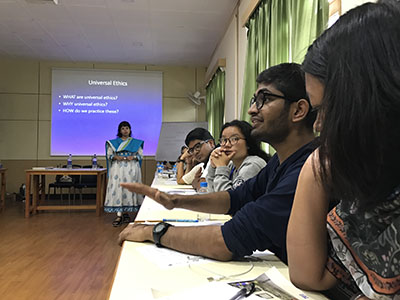 An important area of Foundation’s work is aimed at cultivating the ideas of Universal Ethics among young adults through workshops, dialogues and trainings. It uses elicitive methodology to initiate discussions around human values of compassion, empathy, kindness, patience, tolerance and forgiveness. Foundation’s engagements includes workshops with students and teachers from schools and university from across South Asia and also the development of new and alternative pedagogies.
An important area of Foundation’s work is aimed at cultivating the ideas of Universal Ethics among young adults through workshops, dialogues and trainings. It uses elicitive methodology to initiate discussions around human values of compassion, empathy, kindness, patience, tolerance and forgiveness. Foundation’s engagements includes workshops with students and teachers from schools and university from across South Asia and also the development of new and alternative pedagogies.
The Foundation works extensively with schools and colleges to facilitate the mainstreaming of this approach into curricula.
Ethicate in Schools: A South Asian Journey
“The future of humanity depends on the adoption of a positive mental attitude by the current generation. This is why education is so important. Knowledge is like an instrument, and whether that instrument is put to use in a constructive or destructive way depends on motivation. Modern education is very sound but it seems to be based on a universal acceptance of the importance of developing the brain. Not enough attention is given to the development of the person as a whole, and to encouraging a clear sense of values and a warm heart.” – HHDL
The Universal Ethics and Values workshops organized in various schools across South Asia – Afghanistan, Bangladesh, Bhutan, India, Nepal and Sri Lanka are part of the Ethicate: Ethics in Education program of the Foundation. They are a means to put into practice, His Holiness’ idea that the Millennials be prepared in basic human values that are important for our survival and flourishing.
Since the launch of the program in 2017, workshops have been conducted in Kathmandu, Sangli, Alibagh, Churachandpur, Imphal, Dhaka and Kabul. The workshop curriculum is based on the Compassion Manual for High School Students that the Foundation has commissioned, which includes exercises that promote critical thinking, mindfulness and cultivating compassion. Since most education today centers on cognition and very little effort is put into the affective aspect of human behavior, the workshops are designed to bridge the gap between affective and cognitive learning.
Conducted by, Shreya Jani, Managing Trustee, STEP (Standing Together to Enable Peace) the workshops enable the young participants (between the ages of 13 and 18 years) to reflect on how they can build inner peace and envision a world which is driven by universal values and ethics.
Through elicitive methodology the young participants are encouraged to reflect on contemporary issues in their ‘micro’ communities and at the ‘macro’ level. They then analyze the relevance of values such as kindness, empathy and respect to address these problems. The workshops also enable the participants to become aware of the interconnectedness of their inner self and the surrounding environment that includes their families, communities and beyond.
The workshop duration varies from 4-hour long sessions to two-day long engagements. Post the sessions, those who opt for, are provided refection notebooks that comprise weekly exercises for 3-6 months (depending on each group’s interest) to continue their explorative journey of universal values.
The workshops have drawn participation of over 300 students in the last one year and they come from diverse ethnic, religious and socio-economic backgrounds.
Nepal
The journey of secular ethics and universal values began with Nepal. A post-conflict society, Nepal, is full of hope to implement its new constitution and embrace peace after decades of civil war and unrest. Given the fact that Nepal was until recently a Hindu Kingdom and the Nepalese have crafted a Secular Constitution for themselves, provided an ideal backdrop for conversations and discussion on the meaning of secularism. The students were very excited to explore the idea of secular ethics with their peers.
Three workshops were conducted in Kathmandu with three diverse groups of students. The First workshop was for students from Hakuna Matata, which runs a residential program for HIV positive youth, the second with Saatyaki Pathshala that caters to educational needs of children that belong to socio-economically marginalized families and the third, with Ideal Model Higher Secondary School.
The HIV positive students were very receptive to the leanings and shared that they already practiced mediation and reflection to negotiate through the challenges they were facing in life.
A young participant beautifully summed up the rationale for practicing love and compassion.
“We are human so we should be like human being. Everybody, animal, insects, everything have heart and love that we human being should understand that feeling. Everybody have to die one (day) so why don’t we do good things in our life. We take nothing with our dead body so why we don’t think about that. We should think about that and have to spread the feeling of love.“
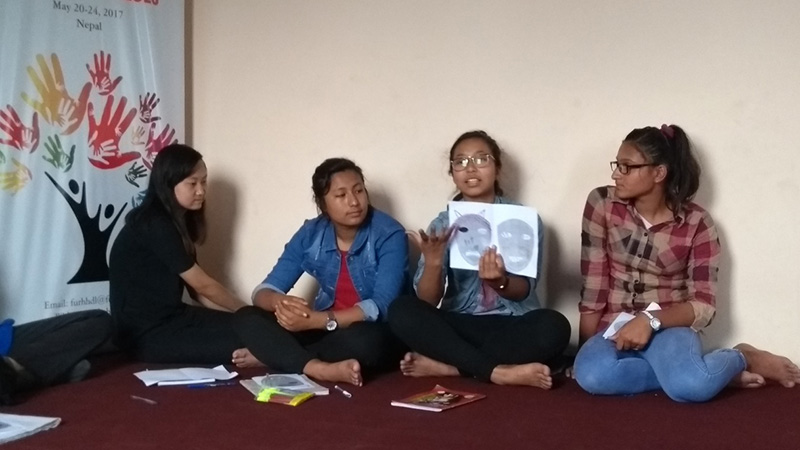 Facilitator’s Reflections: “The day spent with these students left me with some questions and reflection points of my own. I was touched by their joie de vivre and their contemplation of mortality and acceptance. They highlighted that through their struggles, its mediation and understanding of anger, they were able to navigate through a dark period of their lives. I thank these participants for their honest participation and for celebrating human vulnerability with compassion every day of their lives.“
Facilitator’s Reflections: “The day spent with these students left me with some questions and reflection points of my own. I was touched by their joie de vivre and their contemplation of mortality and acceptance. They highlighted that through their struggles, its mediation and understanding of anger, they were able to navigate through a dark period of their lives. I thank these participants for their honest participation and for celebrating human vulnerability with compassion every day of their lives.“
Highlighting this, a female participant shared that “…Human should be helpful. We should respect each others in a need. We should respect all different religions equally without feeling difficulty. We should be tolerance, joyful, helpful. If all the people have this activates and behavior than they can be good humanitarian. We can promote them by discussing together in group. To promote this we should not fight, hate each other. We should be cooperative with each other. We should love juniors and respect elders.“
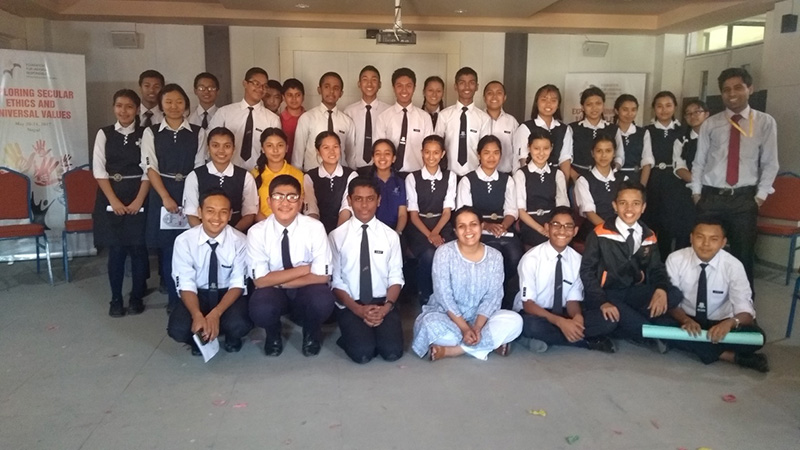 Sidharatha Tamrakar, one of the participants states, that “I learnt that happiness is connected with empathy and our thoughts. Similarly we have full freedom to raise questions when we are not satisfied with who we are and can change ourselves to be better. I learnt about compassion, empathy, happiness and all. I learnt that ideals and imagination are of no use unless it is actually implemented in real.“
Sidharatha Tamrakar, one of the participants states, that “I learnt that happiness is connected with empathy and our thoughts. Similarly we have full freedom to raise questions when we are not satisfied with who we are and can change ourselves to be better. I learnt about compassion, empathy, happiness and all. I learnt that ideals and imagination are of no use unless it is actually implemented in real.“
At the end of their explorations, the participants were asked to write what according to them are universal humanitarian values. What Swechchha Gurang put eloquently, resonated with many others as well. She explains, “The universal humanitarian values are cooperation, generosity, empathy, helpfulness, tolerance, mutual respect, peace, progress, fraternity, good will etc. I am willing to make the following commitments:I will share my knowledge with others; I will work in accordance to my personal values and beliefs; I will raise my voice against oppression I will diligently help others to understand happiness.“
Maharashtra
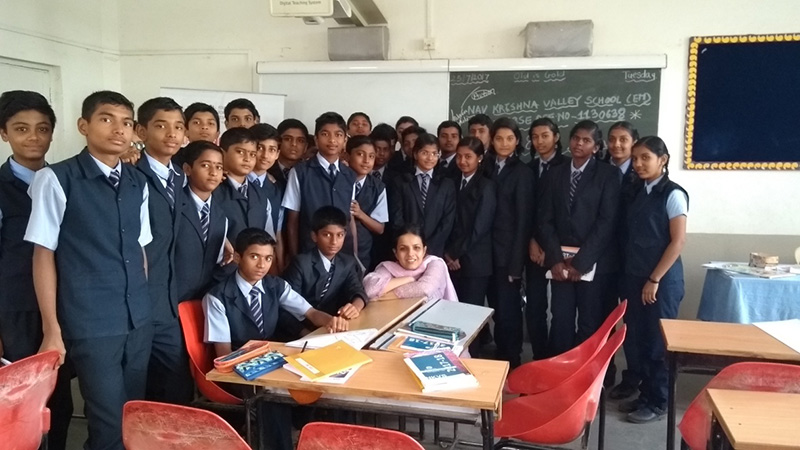
Sangli, Maharashtra (India) was the Second stop after Nepal in the South Asian journey of Universal Ethics and Values. After landing at Mumbai airport, an 8 hour long car journey takes one through the breathtaking monsoon hit Western Ghats to reach Sangli City. It is the headquarters of Sangli district in the Western Indian state of Maharashtra. The workshop in Sangli saw participation of students from Nav Krishna Valley School.
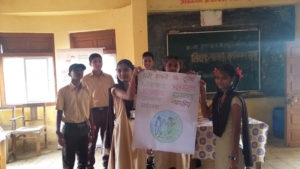 The second Workshop was conducted at Alibagh, Maharashtra. Started during the Colonial times, B.N High School Awas, Alibagh, Maharashtra was the Foundation’s partner in Alibagh.
The second Workshop was conducted at Alibagh, Maharashtra. Started during the Colonial times, B.N High School Awas, Alibagh, Maharashtra was the Foundation’s partner in Alibagh.
The school caters to students of nine nearby villages who are predominately Marathi and Hindi speakers. The workshop on Universal Ethics and Values was the first exposure for the students to interactive pedagogy and they responded with trepidation.
Some of the learnings shared by the participants of the workshop are:
“We learnt about equanimity and balance through various games.“
Koli Apeksha Shanka
“Happiness and sadness is part of life. Both must exist in balance. Thus we should learn to face them both without fear.“
Gauri Umesh Bhagat
“Values I will promote are non-violence, secular, stillness, brotherhood, pollution free, acceptance and justice.“
Priyanka Kishor Bhagn
Anjali Anil Kalap, a participant, expresses, “[I learnt] Values, attitudes, behaviour are things that matter the most in our life. Concentration and intention to lead life are important. Every work should be done after you realize the purpose behind it”. Her classmates further reiterated this idea. Satish Abasaheb Sargar stated, “I learnt that we should think what we are doing first. And always we should [be at] peace and observe small problem first only because [when] we do not see the problem then it becomes [a] big problem.“
Manipur
In Manipur, the workshops on Exploring Secular Ethics and Universal Values were held in October 2017. The two partner schools were Lalpuithluaii Foundation School Churachandpur and Wangkhai Government High School, Imphal. More than 65 students participated in the training workshops.
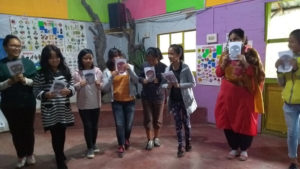 These school have previously participated in a Foundation supported Education for Peace project in 2013. During the earlier project for an entire year workshops were conducted for the students at this school to explore compassion and empathy as antidotes to bullying.
These school have previously participated in a Foundation supported Education for Peace project in 2013. During the earlier project for an entire year workshops were conducted for the students at this school to explore compassion and empathy as antidotes to bullying.
The students were very happy to get another opportunity to deepen their knowledge.
These schools are an oasis of hope amidst chaos and violence that surrounds their immediate vicinity. Students from Imphal also shared the challenge of high prevalence of substance abuse in the community.
As stated by Chiintanhoir, a student participant for this workshop “From these activities I have learnt how to concentrate, what fears do I have in common with my friends and how to overcome them which are all necessary for peace in the world. I can use this in my daily life by encouraging others and promote peace, love, hope and make justice prevail so people can trust me.“
Man Thian Siam Yunglut, another participant implored people to explore universal values and said “Love each other by respecting each other not discriminating. Respect everyone irrespective of his/her religion. Lets not use violence everyone is special. Everyone counts even though our religion is not the same. We must not judge, stereotype others. We must not kill each other, we must stop dropping bombs, bombs are killing our little ones. Children are our future hope, we must learn to help each other.“
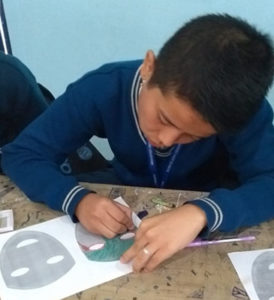 Hongnemshumham Yaiphabi Chanu, a participant in this workshop reflecting on his learnings said “I learnt from these activities that there is lot of scare [fear] and anger in your lives. We [I] should [learn to] control myself. There is also encouragement and positivity in our life. By speaking honestly, politely and sincerely I can promote these values in my life (sic).“
Hongnemshumham Yaiphabi Chanu, a participant in this workshop reflecting on his learnings said “I learnt from these activities that there is lot of scare [fear] and anger in your lives. We [I] should [learn to] control myself. There is also encouragement and positivity in our life. By speaking honestly, politely and sincerely I can promote these values in my life (sic).“
The participants’ message for universal values is summed by Mineral Maibam, who wrote, “Some of the universal humanitarian values are hope, kindness, discipline. When people around me don’t know what to do with their life, I’d like to give them hope to lift her face to the world again. When one meets a trouble which I can help, I’d show kindness by granting him/her a hand. The word ‘discipline’ cannot be denied by words, it should be expressed in body language. One who is disciplined should be cleaned all through his/her mind and body (sic).“
Bangladesh
For the workshops on Exploring Secular Ethics and Universal Values in Bangladesh two schools in Dhaka were selected as partners: Cardiff School and Nabadiganta Adarsha High School, which is a government-aided school. The two workshops were conducted in November 2017.
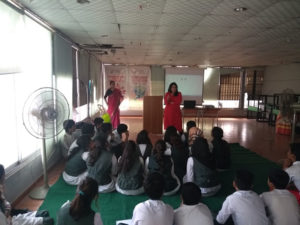 A two-day workshop was conducted with students from Cardiff School, Dhaka. Committed to global education, the school has its own curriculum on value education. An innovative experiment of the school is the ‘honesty shop’─ a school stationary shop where the students are neither supervised nor asked to pay for what they take; the shop runs purely on trust.
A two-day workshop was conducted with students from Cardiff School, Dhaka. Committed to global education, the school has its own curriculum on value education. An innovative experiment of the school is the ‘honesty shop’─ a school stationary shop where the students are neither supervised nor asked to pay for what they take; the shop runs purely on trust.
Following two-days of extensive engagement, Shahdous Zaman Khan Prohar, a student shared his learnings from the workshop in these words, “I got to know that I can control myself and can even rewire my brain for betterment of society and the whole world. I will be able to control my anger and avoid meaningless and unnecessary quarrels. I will also be able to view the world from the perspective of other people.“
Hasan Mahmud Abdullah, a student while making a commitment to universal values expressed, “Universal Humanitarian values are characters and values that all human beings must have in common. It can be love, empathy, generosity, wisdom and conscience. All human beings must respect each other and their differences. Everyone should be given the chance to express opinions and perspectives. To promote the universal Humanitarian values, I pledge to spread knowledge about controlling emotions, thinking differently, rewiring our brains and play different roles at different times in life (sic).“
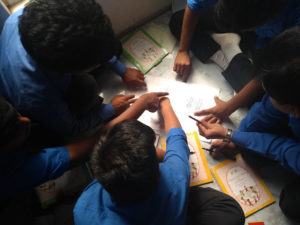 Nabadiganta Adarsha High School is located in a low-income dwelling of Dhaka. The students reflected on some of the issues that they faced in their everyday lives. They identified over-population in Dhaka is a root cause of inequality between man and woman, especially strong preferences for male child. Another problem highlighted was environmental destruction, seen as a result of greed and selfishness as governing values of the society. The participants expressed their keen interest in knowing the reasons for income disparities – what social values make some have more and some less. Many of the students chose to carry the reflection book home, to carry forward the learnings from the workshop.
Nabadiganta Adarsha High School is located in a low-income dwelling of Dhaka. The students reflected on some of the issues that they faced in their everyday lives. They identified over-population in Dhaka is a root cause of inequality between man and woman, especially strong preferences for male child. Another problem highlighted was environmental destruction, seen as a result of greed and selfishness as governing values of the society. The participants expressed their keen interest in knowing the reasons for income disparities – what social values make some have more and some less. Many of the students chose to carry the reflection book home, to carry forward the learnings from the workshop.
Afghanistan
The workshops in Afghanistan were organized in partnership with Marefat High School, Dasht-e-Barchi, Kabul and Khan-e-Noor (KEN) Schools, Kabul and Balkh. The two workshops saw the participation of 35 students.
Committed to holistic education Marefat High School is a unique school which was first established in Rawalpindi Pakistan in 1994 for the refugee children from Afghanistan. The school moved to Kabul in the early 2000s. Committed to providing equal opportunities to girls for education, it sponsors over 250 girls every year and provides them free education. Dasht-e-Barchi is historically and primarily a Hazara dwelling and most of the students at the school belong to this community.
Khana-e-Noor Educational Network has multiple campuses in Kabul and Balkh provinces of Afghanistan, with over 5000 students enrolled at various campuses. It is one of the first private network of institutions that offers education from the school to the university levels. .
Through the workshop the students explored the values that pose a challenge to Afghan society such as discrimination, violence, fear of survival and a sense of discord and mistrust between communities. The students looked at values that can enable peace in Afghanistan such as love, friendship, respect, equality and unity. They highlighted how religious disharmony and clashes between Shias and Sunnis was causing a security concern in the region. They also highlighted that lack of self-esteem and uncertainty about the future was leading to problems of addiction amongst their peers.
They explored how one can arrive at love as a guiding force when there is so much hurt and mistrust amongst communities. The participants also discussed the role of education in promoting peace. They noted that some education actually, actively incites violence.
The participants from the Khana-e-Noor School highlighted that a massive class divide, lust for power and selfishness were leading to most of the insecurity that Afghanistan faces today. Inequality between man and woman, addiction, low self-esteem and depression were other concerns that the youth had. The values that they saw which could help their society were critical thinking, gender equality and income equality and disciplined approach to life.
Looking back at the learnings from the workshop Bahar a student wrote “The most important thing I learnt today is that how can we have a better world ….before this I thought that we should try to change [other] people but today I learned that the most important thing is to change yourself and it is what I will do after (sic) this minute.“
Writing about their learnings form the workshop Zunal Ahmadzai wrote “Today I learned firstly how to train my own mind, how to understand a situation from other people’s mentality [perspective], how to come [up] with different solutions for a problem.” Mustafa another participant wrote “Today I learned about how to change myself and that I can overcome my anger. We can search for the solutions of problems only by thinking deeply and for solutions we need to be united.“
 An important area of Foundation’s work is aimed at cultivating the ideas of Universal Ethics among young adults through workshops, dialogues and trainings. It uses elicitive methodology to initiate discussions around human values of compassion, empathy, kindness, patience, tolerance and forgiveness. Foundation’s engagements includes workshops with students and teachers from schools and university from across South Asia and also the development of new and alternative pedagogies.
An important area of Foundation’s work is aimed at cultivating the ideas of Universal Ethics among young adults through workshops, dialogues and trainings. It uses elicitive methodology to initiate discussions around human values of compassion, empathy, kindness, patience, tolerance and forgiveness. Foundation’s engagements includes workshops with students and teachers from schools and university from across South Asia and also the development of new and alternative pedagogies. 
 Universal Human Values and Ethics
Universal Human Values and Ethics Facilitator’s Reflections: “The day spent with these students left me with some questions and reflection points of my own. I was touched by their joie de vivre and their contemplation of mortality and acceptance. They highlighted that through their struggles, its mediation and understanding of anger, they were able to navigate through a dark period of their lives. I thank these participants for their honest participation and for celebrating human vulnerability with compassion every day of their lives.“
Facilitator’s Reflections: “The day spent with these students left me with some questions and reflection points of my own. I was touched by their joie de vivre and their contemplation of mortality and acceptance. They highlighted that through their struggles, its mediation and understanding of anger, they were able to navigate through a dark period of their lives. I thank these participants for their honest participation and for celebrating human vulnerability with compassion every day of their lives.“ Sidharatha Tamrakar, one of the participants states, that “I learnt that happiness is connected with empathy and our thoughts. Similarly we have full freedom to raise questions when we are not satisfied with who we are and can change ourselves to be better. I learnt about compassion, empathy, happiness and all. I learnt that ideals and imagination are of no use unless it is actually implemented in real.“
Sidharatha Tamrakar, one of the participants states, that “I learnt that happiness is connected with empathy and our thoughts. Similarly we have full freedom to raise questions when we are not satisfied with who we are and can change ourselves to be better. I learnt about compassion, empathy, happiness and all. I learnt that ideals and imagination are of no use unless it is actually implemented in real.“ Sangli, Maharashtra (India) was the Second stop after Nepal in the South Asian journey of Universal Ethics and Values. After landing at Mumbai airport, an 8 hour long car journey takes one through the breathtaking monsoon hit Western Ghats to reach Sangli City. It is the headquarters of Sangli district in the Western Indian state of Maharashtra. The workshop in Sangli saw participation of students from Nav Krishna Valley School.
Sangli, Maharashtra (India) was the Second stop after Nepal in the South Asian journey of Universal Ethics and Values. After landing at Mumbai airport, an 8 hour long car journey takes one through the breathtaking monsoon hit Western Ghats to reach Sangli City. It is the headquarters of Sangli district in the Western Indian state of Maharashtra. The workshop in Sangli saw participation of students from Nav Krishna Valley School.
 The second Workshop was conducted at Alibagh, Maharashtra. Started during the Colonial times, B.N High School Awas, Alibagh, Maharashtra was the Foundation’s partner in Alibagh.
The second Workshop was conducted at Alibagh, Maharashtra. Started during the Colonial times, B.N High School Awas, Alibagh, Maharashtra was the Foundation’s partner in Alibagh. These school have previously participated in a Foundation supported Education for Peace project in 2013. During the earlier project for an entire year workshops were conducted for the students at this school to explore compassion and empathy as antidotes to bullying.
These school have previously participated in a Foundation supported Education for Peace project in 2013. During the earlier project for an entire year workshops were conducted for the students at this school to explore compassion and empathy as antidotes to bullying. Hongnemshumham Yaiphabi Chanu, a participant in this workshop reflecting on his learnings said “I learnt from these activities that there is lot of scare [fear] and anger in your lives. We [I] should [learn to] control myself. There is also encouragement and positivity in our life. By speaking honestly, politely and sincerely I can promote these values in my life (sic).“
Hongnemshumham Yaiphabi Chanu, a participant in this workshop reflecting on his learnings said “I learnt from these activities that there is lot of scare [fear] and anger in your lives. We [I] should [learn to] control myself. There is also encouragement and positivity in our life. By speaking honestly, politely and sincerely I can promote these values in my life (sic).“ A two-day workshop was conducted with students from Cardiff School, Dhaka. Committed to global education, the school has its own curriculum on value education. An innovative experiment of the school is the ‘honesty shop’─ a school stationary shop where the students are neither supervised nor asked to pay for what they take; the shop runs purely on trust.
A two-day workshop was conducted with students from Cardiff School, Dhaka. Committed to global education, the school has its own curriculum on value education. An innovative experiment of the school is the ‘honesty shop’─ a school stationary shop where the students are neither supervised nor asked to pay for what they take; the shop runs purely on trust. Nabadiganta Adarsha High School is located in a low-income dwelling of Dhaka. The students reflected on some of the issues that they faced in their everyday lives. They identified over-population in Dhaka is a root cause of inequality between man and woman, especially strong preferences for male child. Another problem highlighted was environmental destruction, seen as a result of greed and selfishness as governing values of the society. The participants expressed their keen interest in knowing the reasons for income disparities – what social values make some have more and some less. Many of the students chose to carry the reflection book home, to carry forward the learnings from the workshop.
Nabadiganta Adarsha High School is located in a low-income dwelling of Dhaka. The students reflected on some of the issues that they faced in their everyday lives. They identified over-population in Dhaka is a root cause of inequality between man and woman, especially strong preferences for male child. Another problem highlighted was environmental destruction, seen as a result of greed and selfishness as governing values of the society. The participants expressed their keen interest in knowing the reasons for income disparities – what social values make some have more and some less. Many of the students chose to carry the reflection book home, to carry forward the learnings from the workshop.